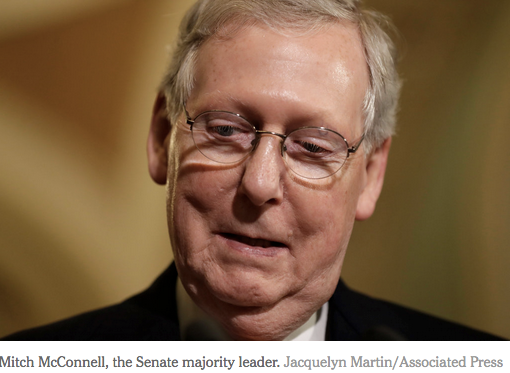What inspired this calculation? The spectacle of Mitch McConnell, the Senate majority leader, and Paul Ryan, the speaker of the House, defending Donald Trump’s firing of James Comey.
Everyone understands that Mr. Comey was fired not because of his misdeeds during the campaign — misdeeds that helped put Trump in the White House — but because his probe of Russian connections with the Trump campaign was accelerating and, presumably, getting too close to home. So this looks very much like the use of presidential power to cover up possible foreign subversion of the U.S. government.
And the two leading Republicans in Congress are apparently O.K. with that cover-up, because the Trump ascendancy is giving them the chance to do what they always wanted, namely, take health insurance away from millions of Americans while slashing taxes on the wealthy.
Donald Trump’s Craven Republican Enablers
t is often said that the U.S. Presidency is a relatively weak office—but that is a contingent statement. To prevent the President from gaining too much power, or abusing that power, the Founding Fathers divided authority among the different branches of government, and established some fundamental governing principles. These are the fabled checks and balances, arranged, as James Bryce, the British jurist, noted in his venerable 1888 tome, “The American Commonwealth,” to “restrain any one department from tyranny.”
But the checks and balances only work if each of Bryce’s departments agrees to play its allotted role. A President enabled by a spineless and supine Congress that fails to exercise its oversight powers isn’t a weak executive at all: he is a potential despot. Using his authority to hire and fire federal officials, he can rapidly remake the government to his own design, appointing loyalists to key positions, eliminating potential threats, and undermining alternative repositories of power.
Authoritarian leaders in foreign countries seize and maintain power this way. And, despite his bungling start, this is the project that Donald Trump appears to have embarked upon. Since the end of January, he has appointed one of his closest political allies, Jeff Sessions, to run the Justice Department; fired an acting Attorney General, Sally Yates, who had warned the White House that the national-security adviser was compromised; and axed forty-six U.S. Attorneys, one of whom, Preet Bharara, had jurisdiction over Trump’s business empire. Now the head of the F.B.I., James Comey, has been ousted, at a time when the agency is conducting an investigation into possible collusion between Trump’s election campaign and the Russian government.
And how has the Republican-controlled Congress responded? On Wednesday, speaking on the Senate floor, Mitch McConnell, the Senate Majority Leader, spoke about Comey’s firing while barely mentioning Trump. Instead, he recalled how Democrats had vociferously criticized Comey’s actions during the F.B.I.’s investigation into Hillary Clinton’s e-mails. He also claimed, falsely, that it was not Trump but Rod Rosenstein, the Deputy Attorney General, who removed Comey. McConnell curtly dismissed calls for the appointment of an independent prosecutor to take over the Russia investigation, saying that such a move would “only serve to impede the current work being done” on Capitol Hill, where committees in the House and Senate are also looking into Russia’s meddling.




